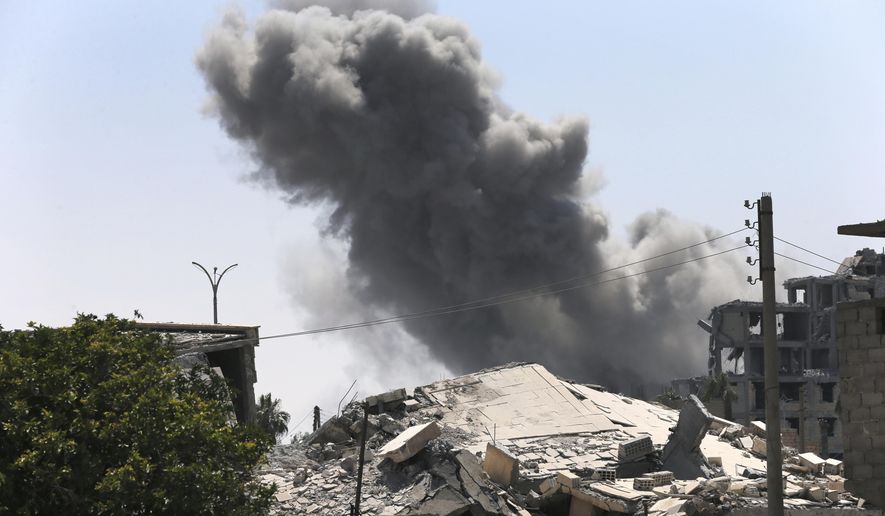The Trump administration is pushing back against critics who say the White House is hyping the ongoing threat of the Islamic State in Syria in order to legally justify an open-ended commitment of U.S. troops in the war zone.
“Look, we are not seeking a pretext or a justification to remain in Syria, and we are not constructing any false reality involving ISIS,” a senior state department official said Friday. “The fact is the fight against ISIS continues. It is real, it is not contrived or imaginary.”
The comments, made on background during a conference call with reporters, came a day after an influential Democrat on Capitol Hill argued the administration’s recently announced plan to keep American troops in Syria for the long haul violates an existing congressional Authorization for the Use of Military Force (AUMF).
“The Trump Administration lacks the authority to keep U.S. military forces in Syria after the defeat of ISIS,” Sen. Ben Cardin, Maryland Democrat and the ranking member on the Senate Foreign Relations Committee, said Thursday. “The State and Defense Departments must immediately consult with the members of the [committee], which retains jurisdiction over the use of military force.”
Mr. Cardin expressed particular concern over the administration’s argument — laid out in a speech this week by Secretary of State Rex Tillerson — that U.S. forces should remain in Syria even after ISIS is defeated to ensure the terror group cannot return. Doing so, according to Mr. Cardin, would put Washington “on the precipice of committing U.S. forces to another forever war.”
Some regional experts went further. Joshua Landis, a Middle East analyst at the University of Oklahoma, argues that the Trump administration is “in a position where it can’t take credit for defeating ISIS in Syria because doing so would create problems for the whole legal justification for U.S. troops being in Syria.”
The administration is “clearly pushing the line that ISIS is still very active in Syria — and that the job is not done — in order to create a legal basis for the open-ended presence of U.S. military forces in the country,” Mr. Landis told The Washington Times.
At the same time, Mr. Landis argued, the administration’s policy is to “use this Kurd-majority defense force that the U.S. military is backing and training as a security shield to prevent Iran and Russia from taking over key oil and gas assets in northern Syria.”
But U.S. officials have pushed back against that characterization as well. One senior official told The Times in an interview this week that, “we never said our policy is to stand up a Kurdish enclave in Syria.”
“There was a mischaracterization by some officials in the media about this,” the official said. “Our policy is to defeat the Islamic State and promote stabilization in liberated areas to ensure the terror group cannot re-emerge and to foster a political process that involves all the different groups on the ground, not just the Kurds.”
The Pentagon revealed last month that there are currently about 2,000 American troops deployed there — roughly four times the number previously disclosed by U.S. officials. While some of the troops are believed to be directly engaged in combat Islamic State elements still active in the war zone, officials have said the troops are there to train and assist local forces in the fight against ISIS.
Debate over the AUMF, meanwhile, has been dragging on for years. The Obama administration was criticized by Republicans and Democrats for clinging to an out-dated 9/11-era authorization to first order the deployment of U.S. force against ISIS in Syria in 2014. But the criticism largely died down when Congress failed to move on creating a new authorization.
The issue has begun rearing its head recently amid claims that a U.S.-backed campaign has largely stripped ISIS of its stronghold in Syria and that the terror group appears to be nearing defeat there. With that as a backdrop, fresh debate on the AUMF spiked anew this week after Mr. Tillerson announced the Trump administration’s plan for open-ended military engagement in Syria.
“We understand that some Americans are skeptical of continued involvement in Syria and question the benefits of maintaining a presence in such a troubled country,” the secretary of state said in a speech Wednesday. “However, it is vital for the United States to remain engaged in Syria,” he said, asserting that the ongoing U.S. troop presence would not only prevent an ISIS resurgence, but be key to denying Iran’s establishment of permanent military influence in the nation.
Mr. Tillerson also said the U.S. forces are necessary to foster stability and a climate for a political transition in Syria.
The issue became heated during Friday’s conference call between a senior state department official and several media outlets when one reporter questioned why the administration seemed to have backed itself into a metaphorical box in which the appearance of a continuing ISIS threat in Syria is needed to justify the the longterm U.S. troop commitment.
“Is there any discussion about trying to actually get some type of a new authorization…to do all of these things that seem on their face to go quite a bit beyond fighting a terrorist group?” the reporter asked.
“When did you stop beating your wife,” responded the senior state department official, apparently frustrated that the question was loaded or unfair.
The official argued that presence of “coherent ISIS elements” in Syria that have “repeatedly reemerged as a military threat is genuine, not imagined.”
“So, the 2001-2002 Authorizations for Use of Military Force are absolutely real and absolutely germane,” the official added. “I am certainly not going to speculate on a hypothetical of where we might be, what authorities might exist were ISIS truly to no longer exist. The fact is they do; the fight continues. The authorizations are absolutely germane to what we are doing.”
• Guy Taylor can be reached at gtaylor@washingtontimes.com.




Please read our comment policy before commenting.